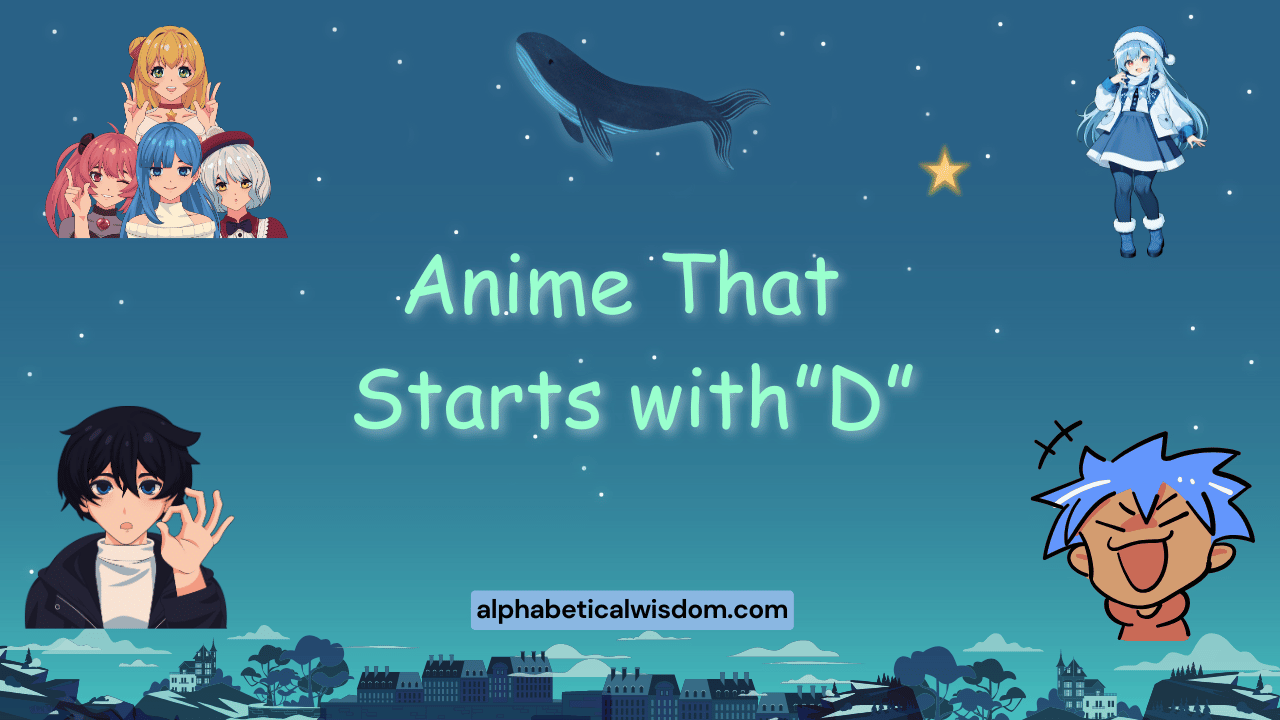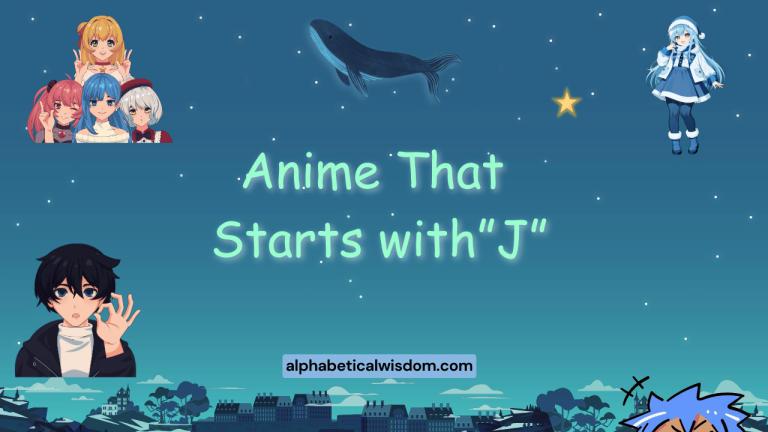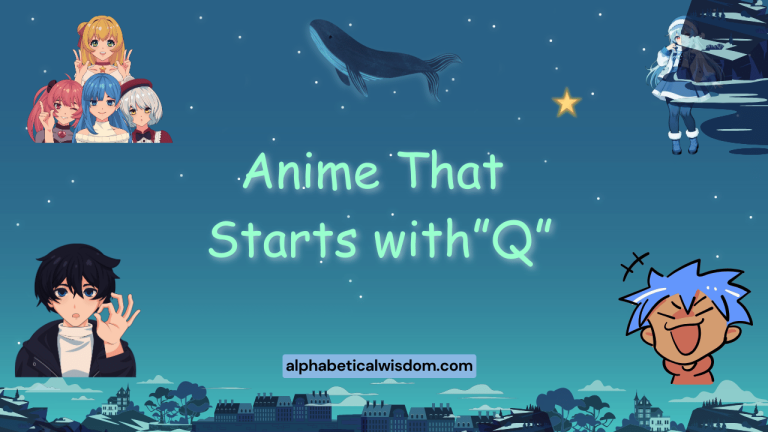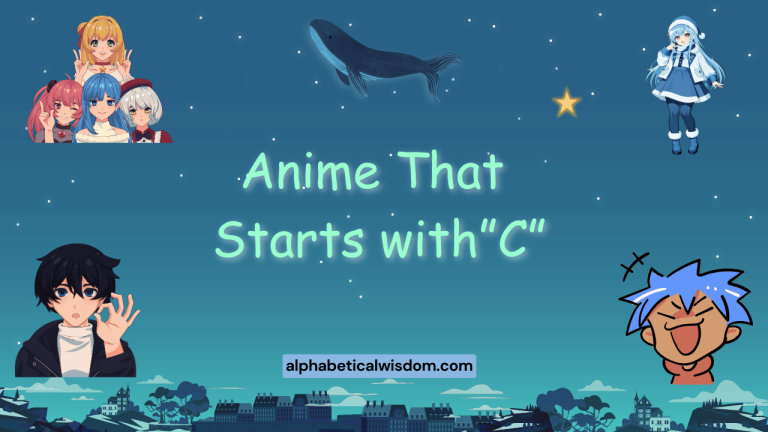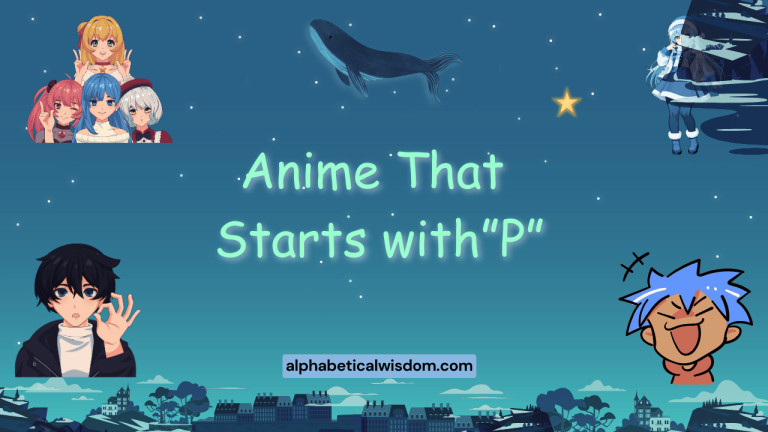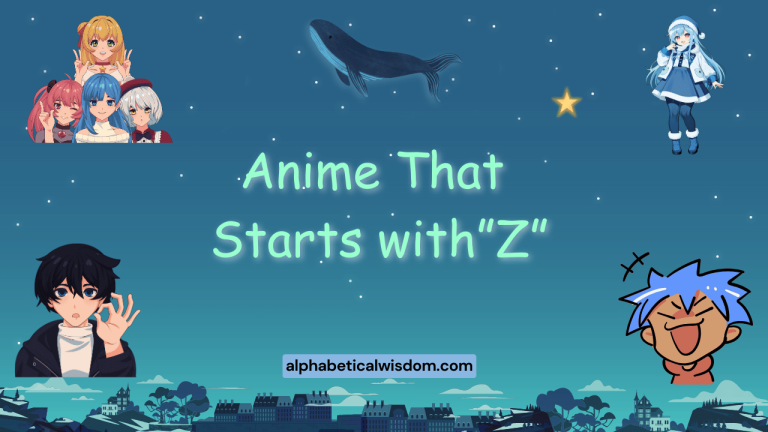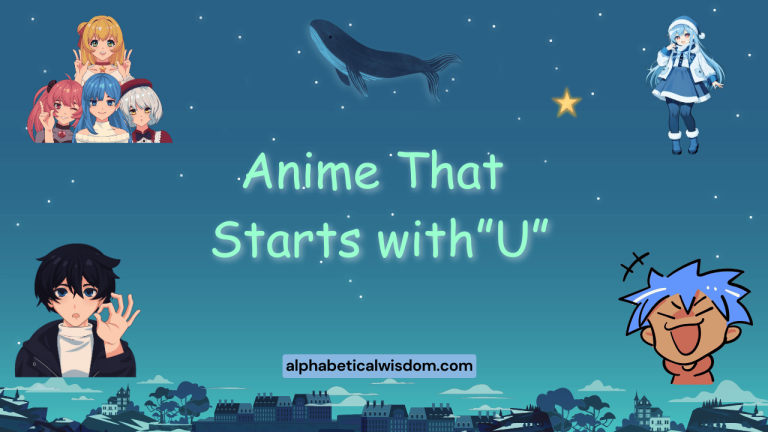Anime Titles Starting with “D”: A Grammatical Exploration
The world of anime offers a rich tapestry of titles, each carefully crafted to capture the essence of the story. While seemingly straightforward, these titles often showcase a diverse range of grammatical structures and linguistic nuances.
This article delves into anime titles that begin with the letter “D,” exploring the grammatical principles at play and providing a comprehensive guide for English language learners. Understanding these principles will not only enhance your appreciation of anime but also strengthen your grasp of English grammar.
This guide is perfect for anime enthusiasts, students of English as a second language, and anyone interested in the intersection of language and popular culture.
Table of Contents
- Introduction
- Definition of Grammatical Elements in Anime Titles
- Structural Breakdown of “D” Anime Titles
- Types and Categories of “D” Anime Titles
- Examples of Anime Titles Starting with “D”
- Usage Rules and Grammatical Considerations
- Common Mistakes in Understanding Anime Titles
- Practice Exercises
- Advanced Topics: Nuances and Cultural Context
- Frequently Asked Questions
- Conclusion
Introduction
Anime, a vibrant form of Japanese animation, has captivated audiences worldwide. Beyond the captivating storylines and stunning visuals, anime titles themselves offer a fascinating glimpse into the intricacies of language and grammar.
By examining titles that begin with the letter “D,” we can uncover a variety of grammatical structures, from simple nouns and verbs to complex phrases and clauses. This exploration will not only deepen your understanding of English grammar but also enrich your appreciation of the art of anime titling.
This article is designed for learners of all levels, from beginners to advanced students. We will break down complex grammatical concepts into easy-to-understand explanations, providing numerous examples and practice exercises to reinforce your learning.
Whether you are an anime enthusiast looking to enhance your understanding of the language or an English language learner seeking a fun and engaging way to improve your grammar skills, this article will provide valuable insights and practical tools.
Definition of Grammatical Elements in Anime Titles
Understanding the grammatical elements present in anime titles is crucial for accurate interpretation and analysis. These elements can range from simple nouns and verbs to more complex phrases and clauses.
Let’s define some key grammatical terms relevant to our exploration of “D” anime titles.
Nouns
A noun is a word that names a person, place, thing, or idea. In anime titles, nouns often represent the central theme, character, or setting of the story. For instance, in the title “Devilman Crybaby,” “Devilman” is a noun referring to the protagonist.
Verbs
A verb is a word that expresses an action, occurrence, or state of being. Verbs can indicate what a character does, what happens in the story, or the overall condition of the anime’s world. For example, in the title “Darling in the Franxx,” while “Darling” is a noun, the implied action of being a ‘darling’ or beloved is present.
Adjectives
An adjective is a word that describes a noun or pronoun. Adjectives add detail and specificity to anime titles, providing insights into the qualities or characteristics of the subject. For example, “Dangerous” in a title like “Dangerous Detective” gives information about the detective.
Adverbs
An adverb modifies a verb, adjective, or another adverb. Adverbs can indicate how, when, where, or to what extent an action is performed. While less common in titles, they can add nuance and emphasis. An example might be something like “Daringly Dancing Divas.”
Prepositions
A preposition is a word that shows the relationship between a noun or pronoun and another word in the sentence. Prepositions often indicate location, direction, or time. While less frequent in standalone titles, they appear in phrases. An example would be a title like “Dawn of the Dragons.”
Phrases and Clauses
A phrase is a group of words that functions as a single unit but does not contain both a subject and a verb. A clause, on the other hand, contains both a subject and a verb. Anime titles often consist of phrases or clauses that encapsulate the essence of the story. For example, “Date A Live” is a phrase, while “Death Note is Real” would be a clause.
Structural Breakdown of “D” Anime Titles
The structure of anime titles can vary significantly, reflecting the diverse range of stories and themes explored in the medium. Understanding the common structural patterns can help you analyze and interpret these titles more effectively.
Single-Word Titles
Some anime titles consist of a single word, typically a noun or adjective that encapsulates the central theme or concept. These titles are often concise and memorable.
Examples include “Devilman” or “Digimon.”
Noun Phrases
Many anime titles are noun phrases, consisting of a noun and its modifiers. These phrases provide more specific information about the subject of the story.
Examples include “Darker than Black” and “Daily Lives of High School Boys.”
Verb Phrases
Anime titles can also be verb phrases, emphasizing the action or state of being that is central to the story. These titles often use gerunds or infinitives.
An example would be “Dancing in the Vampire Bund.”
Clauses
Less commonly, anime titles may consist of complete clauses, containing both a subject and a verb. These titles offer a more complete statement about the story.
An example would be “Do You Love Your Mom and Her Two-Hit Multi-Target Attacks?”
Compound Titles
Some anime titles are compound, combining two or more words or phrases to create a more complex and evocative title. These titles often hint at multiple themes or aspects of the story.
Examples include “Dragon Ball Z” and “Detective Conan.”
Types and Categories of “D” Anime Titles
Anime titles starting with “D” can be categorized based on their grammatical structure and thematic content. This categorization helps in understanding the diverse ways in which language is used to represent different genres and narratives.
Descriptive Titles
These titles use adjectives and adverbs to describe the characters, settings, or events in the anime. They aim to create a vivid image in the viewer’s mind.
Examples include “Dangerous Detective” or “Darker than Black.”
Action-Oriented Titles
These titles emphasize the action and adventure aspects of the anime, often using strong verbs and dynamic nouns. Examples include “Dragon Ball” or “Devil May Cry.”
Character-Focused Titles
These titles highlight the main characters of the anime, often using their names or defining characteristics. Examples include “Devilman Crybaby” or “Detective Conan.”
Thematic Titles
These titles focus on the central themes and concepts explored in the anime, such as love, friendship, or destiny. Examples include “Date A Live” or “Death Note.”
Symbolic Titles
These titles use symbolic language and imagery to represent the deeper meanings and messages of the anime. These are often more abstract and require interpretation.
An example might be “Dawn of the Brave.”
Examples of Anime Titles Starting with “D”
This section provides a comprehensive list of anime titles starting with the letter “D,” categorized by their grammatical structure and function. Each example is accompanied by a brief explanation of its grammatical elements.
Table 1: Noun-Based Anime Titles Starting with “D”
The following table showcases anime titles where the primary focus is on a noun, representing a key element, character, or concept within the series.
| Anime Title | Grammatical Analysis | Brief Description |
|---|---|---|
| Devilman Crybaby | Compound noun (Devilman + Crybaby) | A demonically-powered human who fights against other demons. |
| Digimon | Noun (Digital Monsters) | Children who partner with digital monsters. |
| Dragon Ball | Noun (Dragon + Ball) | A quest to collect magical dragon balls. |
| Death Note | Noun (Death + Note) | A notebook that allows the user to kill anyone by writing their name. |
| Danganronpa | Noun (Bullet + Refutation) | A group of high school students trapped in a deadly game. |
| Dimension W | Noun (Dimension + W) | A world powered by interdimensional energy. |
| Dog Days | Noun (Dog + Days) | A warrior summoned to a world inhabited by anthropomorphic dogs. |
| Durarara!! | Onomatopoeia/Noun (Sound of rumbling) | Strange happenings in Ikebukuro, Tokyo. |
| Deadman Wonderland | Noun (Deadman + Wonderland) | A prison amusement park. |
| Den-noh Coil | Noun (Cyber Coil) | Children using augmented reality glasses in a futuristic city. |
| Dark Gathering | Noun (Dark + Gathering) | A college freshman drawn into a world of spirits. |
| Darwin’s Game | Noun (Darwin + Game) | A social game with deadly consequences. |
| Delicious in Dungeon | Noun (Delicious + Dungeon) | Adventurers cooking and eating monsters in a dungeon. |
| Diary of Our Days at the Breakwater | Noun (Diary + Days + Breakwater) | A girl’s life after moving to a seaside town. |
| Dr. Stone | Noun (Doctor + Stone) | A boy trying to rebuild civilization after everyone is petrified. |
| Dragon Crisis! | Noun (Dragon + Crisis) | A high school boy protecting a dragon girl. |
| Dance in the Vampire Bund | Noun (Dance + Vampire + Bund) | A vampire princess creates a special district. |
| Daimidaler the Sound Robot | Noun (Daimidaler + Sound + Robot) | A boy who pilots a robot powered by his perversion. |
| Demon Slayer | Noun (Demon + Slayer) | A boy joins a demon-slaying corps. |
| Domestic Girlfriend | Noun (Domestic + Girlfriend) | A boy living with his teacher and stepsister. |
| Date A Live | Noun (Date + Live) | A boy who must date spirits to seal their power. |
| Dies Irae | Noun (Day of Wrath in Latin) | A battle against supernatural forces. |
| Divine Gate | Noun (Divine + Gate) | Children with special powers seeking the Divine Gate. |
| Dropout Idol Fruit Tart | Noun (Dropout + Idol + Fruit Tart) | A group of dropout idols trying to save their home. |
| Dimension High School | Noun (Dimension + High School) | Students transported to another dimension. |
Table 2: Adjective-Based Anime Titles Starting with “D”
This section presents anime titles where an adjective plays a crucial role in describing the tone, setting, or characters of the story.
| Anime Title | Grammatical Analysis | Brief Description |
|---|---|---|
| Darker than Black | Adjective (Darker) + Preposition (than) + Noun (Black) | Contractors with supernatural abilities operating in a dark world. |
| Dangerous Detective | Adjective (Dangerous) + Noun (Detective) | A detective who is known for his reckless behavior. |
| DearS | Adjective (Dear) + Noun (pluralized and stylized) | Aliens who crash-land on Earth and integrate into society. |
| Dirty Pair | Adjective (Dirty) + Noun (Pair) | Two female agents known for causing collateral damage. |
| Daily Lives of High School Boys | Adjective (Daily) + Noun (Lives) + Preposition (of) + Noun (High School Boys) | The humorous everyday experiences of high school boys. |
| Dream Eater Merry | Adjective (Dream) + Noun (Eater) + Noun (Merry) | A boy who can see and interact with dreams. |
| Dakaretai Otoko 1-i ni Odosarete Imasu. | Adjective (Dakaretai – Most Desired) | A popular actor is threatened by a newcomer. |
| Devil Survivor 2 The Animation | Adjective (Devil + Survivor) | A group of teenagers fighting demons to save Japan. |
| Dynamic Chord | Adjective (Dynamic) + Noun (Chord) | Four bands navigate the music industry. |
| Daiguard | Adjective (Dai – Great) + Guard | A giant robot defending the city. |
| Detailed Explorations of Yoko Asakura | Adjective (Detailed) + Noun (Explorations) | A spin-off from “The Melancholy of Haruhi Suzumiya”. |
| Dear Brother | Adjective (Dear) + Noun (Brother) | A girl attending an all-girls school. |
| Dark Cat | Adjective (Dark) + Noun (Cat) | A cat with magical powers. |
| Delicious Party Pretty Cure | Adjective (Delicious) + Noun (Party) | Magical girls who fight evil. |
| Detonator Orgun | Adjective (Detonator) + Noun (Orgun) | A mysterious alien weapon. |
| Devils’ Line | Adjective (Devils’) + Noun (Line) | A romance between a human and a vampire. |
| Dirty Joke Guild | Adjective (Dirty) + Noun (Joke) + Noun (Guild) | A comedy about a guild of dirty joke tellers. |
| Dances with the Dragons | Verb (Dances) + Preposition (with) + Noun (Dragons) | Dragon exterminators in a fantasy world. |
| Do You Love Your Mom and Her Two-Hit Multi-Target Attacks? | Verb (Do) + Pronoun (You) + Verb (Love) | A boy who ends up in a game world with his overpowered mom. |
| Divine Dolls | Adjective (Divine) + Noun (Dolls) | Living dolls who protect a village. |
| Dog & Scissors | Noun (Dog) + Conjunction (&) + Noun (Scissors) | A boy reborn as a dog. |
| Dragonar Academy | Noun (Dragonar) + Noun (Academy) | A school where students train with dragons. |
| Dream 9 Toriko & One Piece & Dragon Ball Z Super Collaboration Special!! | Noun (Dream) + Number (9) | A crossover special between popular anime series. |
Table 3: Verb-Based Anime Titles Starting with “D”
This table lists anime titles that use verbs to highlight the action, theme, or central conflict of the story.
| Anime Title | Grammatical Analysis | Brief Description |
|---|---|---|
| Date A Live | Verb (Date) + Article (A) + Noun (Live) | A boy who must date spirits to seal their powers. |
| Devil May Cry | Noun (Devil) + Verb (May) + Verb (Cry) | A demon hunter who fights against evil. |
| Dances with the Dragons | Verb (Dances) + Preposition (with) + Article (the) + Noun (Dragons) | Dragon exterminators in a fantasy world. |
| Do You Love Your Mom and Her Two-Hit Multi-Target Attacks? | Verb (Do) + Pronoun (You) + Verb (Love) | A boy who ends up in a game world with his overpowered mom. |
| Diebuster | Verb (Die) + Noun (Buster) | A young girl piloting a robot to fight aliens. |
| Detonator Orgun | Verb/Adjective (Detonator) + Noun (Orgun) | A mysterious alien weapon. |
| Digimon Adventure | Verb (Adventure) | Children who partner with digital monsters. |
| Dragonaut – The Resonance | Verb (Resonance) | A battle against an approaching threat to Earth. |
| Didn’t I Say to Make My Abilities Average in the Next Life?! | Verb (Say) | A girl who wants to live a normal life in another world. |
Usage Rules and Grammatical Considerations
When analyzing anime titles, it’s important to consider the specific rules and conventions of English grammar. While some titles may intentionally deviate from these rules for stylistic effect, a solid understanding of the basics is essential for accurate interpretation.
Subject-Verb Agreement
In titles that consist of clauses, the subject and verb must agree in number. For example, “Death Note *Is* Real” is grammatically correct, while “Death Note *Are* Real” is incorrect.
Article Usage
The use of articles (a, an, the) can significantly impact the meaning of a title. For example, “A Devilman” implies one specific devilman, while “The Devilman” suggests a particular devilman known to the audience.
Tense Consistency
Titles that express actions or events should maintain consistent tense. For example, “Dragon Ball *Is* Returning” is in the present continuous tense, while “Dragon Ball *Returned*” is in the past tense.
Word Order
English follows a Subject-Verb-Object (SVO) word order. While anime titles may sometimes deviate from this order for emphasis, it’s important to recognize the standard structure.
For example, “You Love Mom” follows SVO, while “Love You Mom” is less conventional.
Common Mistakes in Understanding Anime Titles
Analyzing anime titles can be challenging, and learners often make common mistakes in their interpretation. This section addresses some of these errors and provides correct examples.
Misinterpreting Word Meaning
Incorrect: Assuming “Date A Live” refers to a historical event.
Correct: Understanding that “Date” in this context means to go on a romantic outing.
Ignoring Grammatical Structure
Incorrect: Analyzing “Darker than Black” as a single noun.
Correct: Recognizing that “Darker” is an adjective in the comparative form.
Overlooking Cultural Context
Incorrect: Dismissing “Durarara!!” as gibberish.
Correct: Understanding that “Durarara!!” is an onomatopoeia representing a specific sound, common in Japanese culture.
Table 4: Correct vs. Incorrect Examples
The table below provides examples of common mistakes and their corrections.
| Mistake | Incorrect | Correct |
|---|---|---|
| Misinterpreting Word Meaning | Assuming “Date A Live” is about a historical event. | Understanding “Date” refers to a romantic outing. |
| Ignoring Grammatical Structure | Analyzing “Darker than Black” as a single noun. | Recognizing “Darker” as a comparative adjective. |
| Overlooking Cultural Context | Dismissing “Durarara!!” as gibberish. | Understanding “Durarara!!” is an onomatopoeia. |
Practice Exercises
Test your understanding of anime titles starting with “D” by completing the following exercises. Identify the grammatical structure of each title and explain its potential meaning.
Exercise 1: Identifying Grammatical Structure
For each anime title, identify the main grammatical structure (e.g., noun phrase, verb phrase, clause).
- Devilman Crybaby
- Darker than Black
- Date A Live
- Dragon Ball
- Delicious in Dungeon
- Dangerous Detective
- Darwin’s Game
- Dream Eater Merry
- Dies Irae
- Dog Days
Exercise 2: Explaining Title Meaning
Explain the potential meaning or significance of each anime title based on its grammatical structure and word choice.
- Devilman Crybaby
- Darker than Black
- Date A Live
- Dragon Ball
- Delicious in Dungeon
- Dangerous Detective
- Darwin’s Game
- Dream Eater Merry
- Dies Irae
- Dog Days
Table 5: Answers to Practice Exercises
The following table contains the answers to the practice exercises above.
| Question | Answer (Exercise 1: Grammatical Structure) | Answer (Exercise 2: Title Meaning) |
|---|---|---|
| 1. Devilman Crybaby | Compound Noun | A demonically-powered hero who is prone to crying or showing emotion. |
| 2. Darker than Black | Adjective Phrase | A world that is even more sinister or morally ambiguous than what is considered “black” or evil. |
| 3. Date A Live | Verb Phrase | To go on a date in order to stay alive or prevent something bad from happening. |
| 4. Dragon Ball | Noun Phrase | A magical ball associated with a dragon, likely granting wishes or possessing great power. |
| 5. Delicious in Dungeon | Adjective Phrase | Finding or creating delicious food within a dungeon setting, possibly involving unusual ingredients. |
| 6. Dangerous Detective | Adjective Noun | A detective who is known for being risky, reckless, or putting themselves in harm’s way. |
| 7. Darwin’s Game | Noun Phrase | A game based on the principles of Darwinism, likely involving survival of the fittest and evolution. |
| 8. Dream Eater Merry | Noun Phrase | A character named Merry who consumes or interacts with dreams in some way. |
| 9. Dies Irae | Noun Phrase | A Latin phrase meaning “Day of Wrath,” suggesting a cataclysmic event or divine judgment. |
| 10. Dog Days | Noun Phrase | A period of hot, oppressive weather, often associated with laziness or inactivity, possibly involving dogs. |
Advanced Topics: Nuances and Cultural Context
Beyond the basic grammatical structures, anime titles often incorporate cultural references, puns, and subtle nuances that can be challenging for non-native speakers to grasp. Understanding these advanced topics can deepen your appreciation of the art of anime titling.
Cultural References
Many anime titles allude to Japanese folklore, mythology, or historical events. These references can add layers of meaning and significance to the title.
For instance, “Dies Irae” is a Latin term, hinting at the anime’s themes of apocalypse and divine judgment.
Puns and Wordplay
Japanese language is rich in puns and wordplay, and anime titles often take advantage of this linguistic feature. These puns can be difficult to translate and require a deep understanding of the Japanese language and culture.
Stylistic Variations
Anime titles may intentionally deviate from standard grammatical rules for stylistic effect. This can include using unconventional word order, omitting articles, or creating neologisms (new words).
These variations are often used to create a unique and memorable title.
Frequently Asked Questions
This section answers frequently asked questions about understanding anime titles and their grammatical structures.
- Why are some anime titles so long and complex?
Long and complex titles are often used to convey specific details about the plot, characters, or themes of the anime. They can also be used to create a sense of intrigue and draw viewers in.
- How important is it to understand the grammar of anime titles?
Understanding the grammar of anime titles can enhance your comprehension of the story and its underlying messages. It can also provide insights into the cultural context and artistic intentions of the creators.
- Are there any resources for learning more about Japanese grammar and culture?
Yes, there are numerous online resources, textbooks, and language courses that can help you learn Japanese grammar and culture. Additionally, watching anime with subtitles and reading articles about Japanese culture can be beneficial.
- Why do some anime titles use English words?
The use of English words in anime titles is a common stylistic choice, often used to create a sense of modernity, coolness, or international appeal. It can also be used to convey specific meanings or concepts that are difficult to express in Japanese.
- How can I improve my ability to analyze anime titles?
Practice analyzing a variety of anime titles, paying attention to their grammatical structure, word choice, and cultural context. Consult online resources and language experts for assistance when needed.
- What is the significance of onomatopoeia in anime titles?
Onomatopoeia, or words that imitate sounds, is a common feature of Japanese language and culture. In anime titles, onomatopoeia can be used to create a vivid and memorable impression of the story’s atmosphere or events.
- Are there any specific grammatical rules that are often broken in anime titles?
Yes, anime titles may sometimes deviate from standard grammatical rules for stylistic effect or to create a more memorable title. This can include omitting articles, using unconventional word order, or creating neologisms.
- How does the genre of an anime affect its title?
The genre of an anime often influences its title. For example, action anime titles may use strong verbs and dynamic nouns, while romance anime titles may use more emotive and descriptive language.
- What is the role of translation in understanding anime titles?
Translation plays a crucial role in understanding anime titles, especially for non-native speakers. However, translations can sometimes lose the nuances and cultural references of the original title, so it’s important to be aware of these limitations.
- How do anime titles reflect Japanese culture?
Anime titles reflect Japanese culture in various ways, including their use of cultural references, puns, and stylistic conventions. They can also provide insights into Japanese values, beliefs, and social norms.
- What are some common themes reflected in “D” anime titles?
Common themes in “D” anime titles include darkness, danger, dreams, demons, and destiny. These themes often reflect the darker or more fantastical aspects of the stories.
- How can understanding anime titles improve my English language skills?
Analyzing anime titles can improve your English language skills by enhancing your vocabulary, grammar, and cultural understanding. It can also provide a fun and engaging way to learn about language and culture.
Conclusion
Exploring anime titles that start with the letter “D” provides a fascinating lens through which to examine English grammar and linguistic nuances. By understanding the grammatical structures, usage rules, and common mistakes associated with these titles, learners can enhance their appreciation of anime and strengthen their language skills.
From simple nouns to complex phrases, each title offers a unique glimpse into the world of anime and the art of storytelling.
Remember to practice regularly, consult reliable resources, and embrace the cultural context of anime titles. By doing so, you can unlock a deeper understanding of the language and culture behind this captivating art form.
Keep exploring, keep learning, and keep enjoying the world of anime!
